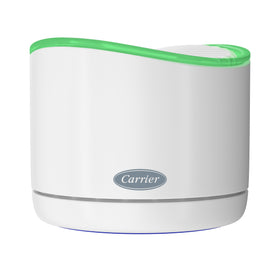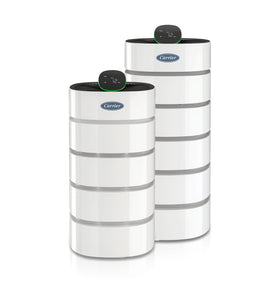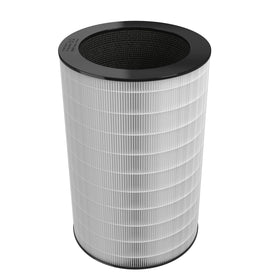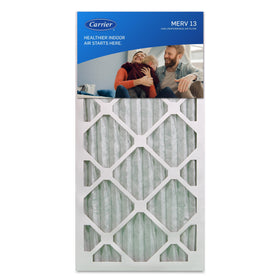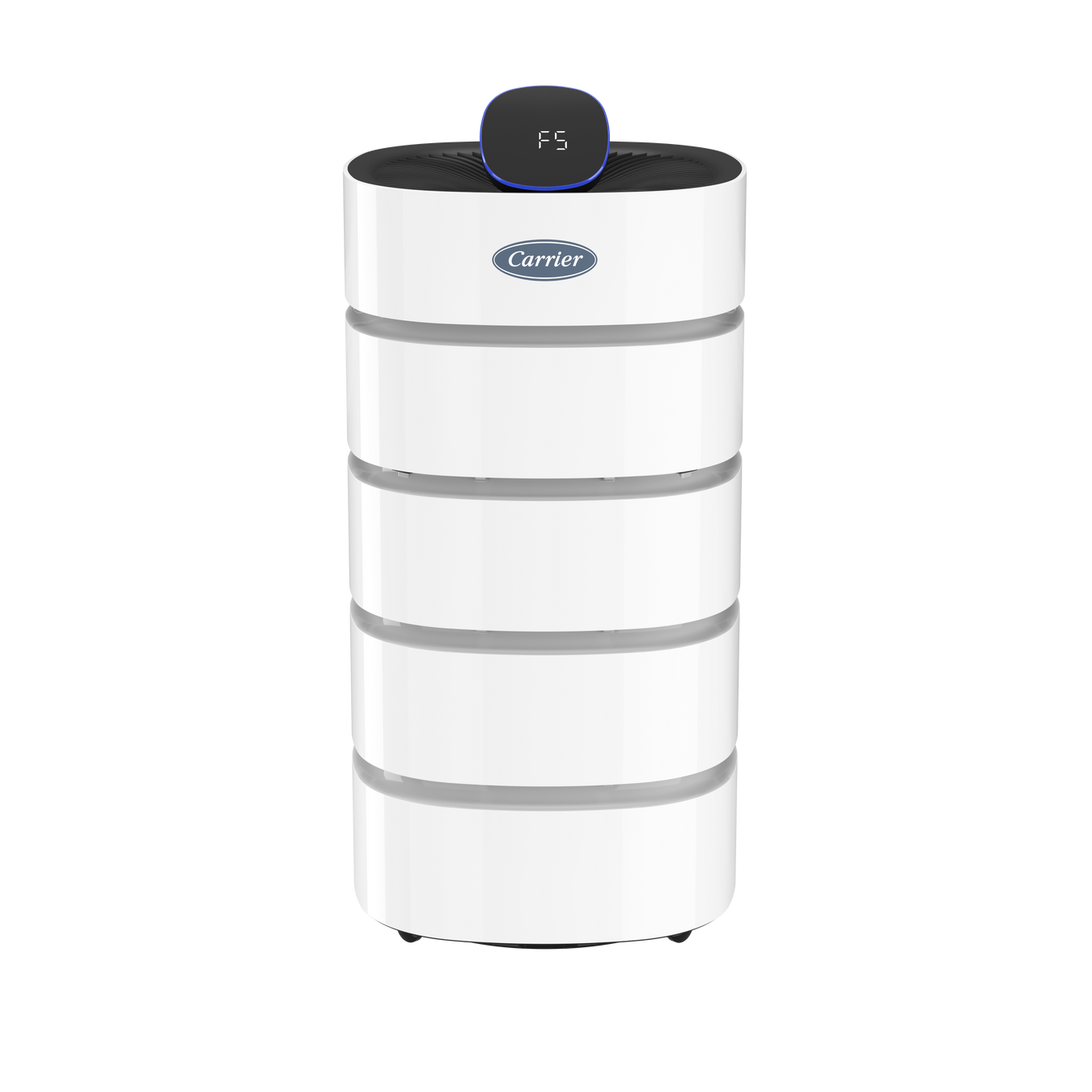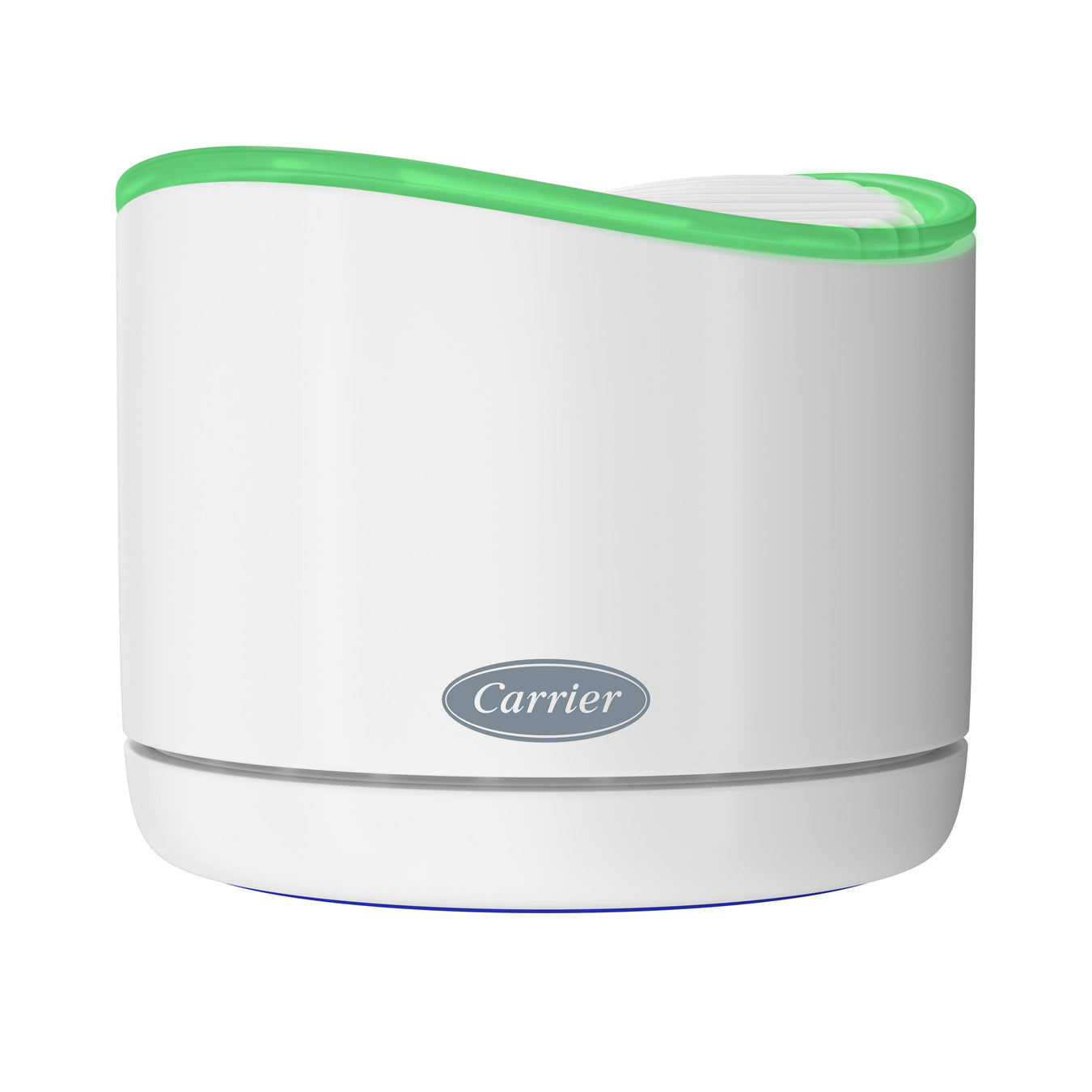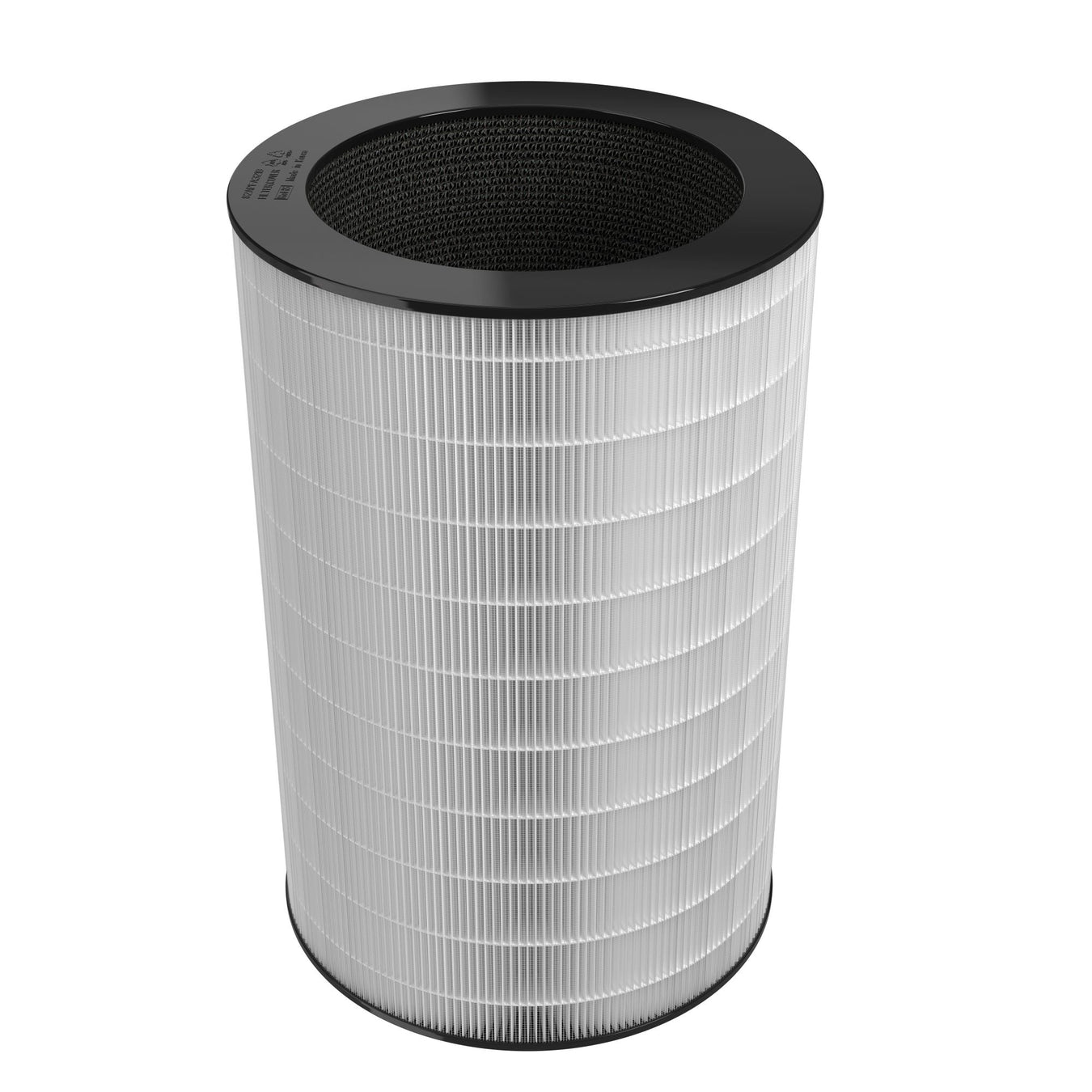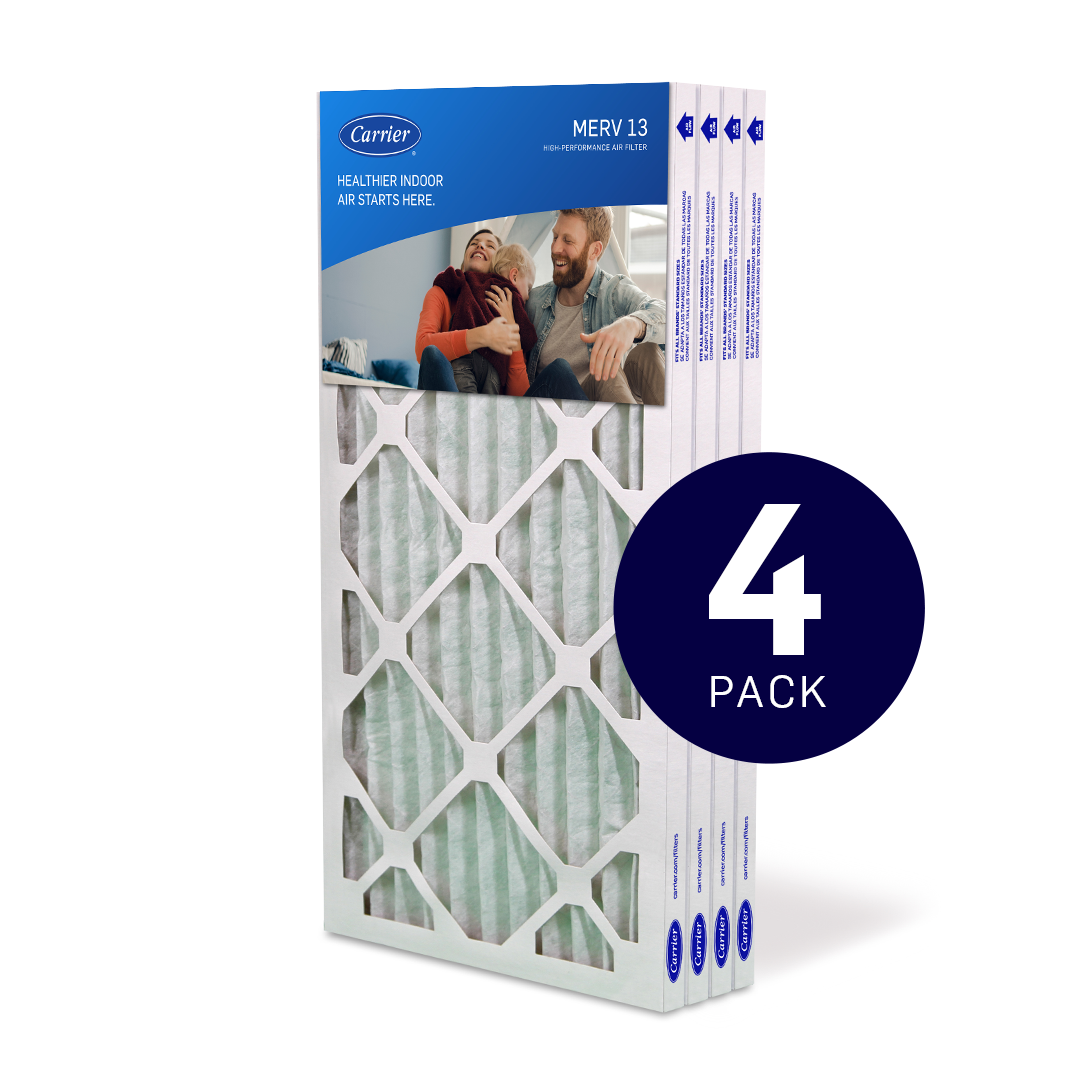
Air Purifier for Allergies
Are there air purifiers for allergies and asthma? Well, sort of. While air purifiers don’t directly treat allergies or asthma, they can help filter allergens that are known to cause allergy and asthma symptoms. It’s also important to understand that an air purifier isn’t a silver bullet that cures all ails, but it can go a long way to help improve your indoor air quality along a multi-pronged approach that includes both reducing the source of pollutants and improved ventilation.1
As we’ll discuss, Carrier air purifiers can help filter allergens and other pollutants for cleaner, healthier indoor air. This is good news for the more than 50 million Americans who experience allergies — from mild to severe — each year, according to the Asthma and Allergy Foundation of America (AAFA).2 An additional 25 million Americans, or approximately one in 13 people, suffer from asthma, a chronic condition that causes the lungs’ airways to alternately swell or contract, and that can be fatal if untreated. Added up, these symptoms result in more than 14.2 million missed workdays and 13.8 million missed school days each year.3
Regardless of the time of year, allergies are one of the most common ailments suffered by the general public. Itching, watery eyes, sneezing, postnasal drip, coughing … the list goes on and on, with allergies serving as the sixth leading cause of chronic illness in America, AAFA says.2

One common understanding is that allergies are largely caused by exposure to seasonal changes in the weather and the allergens produced in nature, particularly in the springtime. In truth, allergies don’t only affect people who spend time outdoors, as many allergens are produced indoors. Pet dander, furniture, bedsheets, dust and other common household items contain airborne particles that can quickly bring on the runny noses and scratchy throats that plague so many of us.
The Environmental Protection Agency offers three basic steps to help improve your indoor air quality: reducing the source of pollutants, improving ventilation and adding an air purifier.4 Because air quality truly matters, Carrier offers a range of air purifiers that are designed for a variety of room sizes to help reduce allergens that are known to cause allergy and asthma symptoms. Shop Carrier air purifiers.
Best Air Purifier for Allergies and Asthma
As with any technology, there is a vast array of options available on the market when it comes to air purifiers. From HEPA filters to activated carbon purifiers, ionizers and ozone generators, the choices can often seem confusing, leading to indecision and, unfortunately, continued suffering from breathing polluted air without taking helpful action. Learning the difference between all the options can help you make an educated decision when it comes time to invest in an air purifier.
Let’s begin with a quick rundown of each of the most popular air purifier types.
Purifiers that include an activated carbon filter: One option for air purifying involves the use of an activated carbon filter, which removes odors from the air. On its own, a carbon air purification system will not effectively eliminate allergens but will work well to reduce odors. Activated carbon filters are often paired with true HEPA filters, detailed below.
Ionizers and ozone generators: Manufacturers of ionizers state that they use electronically charged particles or negative ions, causing impurities in the air to stick to objects within your home, which must be cleaned quite regularly. Ozone purifiers aren’t recommended for residential homes due to safety concerns. Additionally, according to the EPA, they also lack scientific basis for their claims and are ineffective in controlling indoor air pollution.5
HEPA: Considered the gold standard in air purification, HEPA is short for High Efficiency Particulate Air purification. Using finely constructed filters to trap particulate matter from the air, these purifiers are effective at capturing 99.97% of airborne particles 0.3 microns in size. HEPA filters are easily replaced, and a moderately frequent changing schedule is recommended. Learn more about when to change your filters here.

A note of caution: many manufacturers offer products labeled as “HEPA-like,” but these are often not true HEPA air purifiers and are generally cheap imitations. It is recommended that consumers only purchase true HEPA systems from a trusted manufacturer such as Carrier’s Smart Air Purifier line.
Carrier’s Smart Air Purifiers have 18 fan speeds and include pre-filters for large particles and use true HEPA filters for small particulate matter (PM 2.5). They are rigorously designed to significantly reduce particulate matter in the air, including allergens known to cause allergy and asthma symptoms. Each of Carrier’s Smart Air Purifier systems hold an Association of Home Appliance Manufacturers (AHAM) certification, which involves independent laboratory verification and stringent testing. AHAM has developed a standard for measuring the efficacy of an air purifier called the Clean Air Delivery Rate (CADR). CADR informs you of the volume of filtered air produced by an air purifier and provides a separate score for tobacco smoke, pollen, and dust. AHAM recommends the CADR of an air purifier to be at least two thirds of your room’s area.6 Long trusted as a measure of an air purifier’s efficiency, the CADR score is the industry benchmark, and the higher the score, the better and more efficient the unit is. For example, the Smart Air Purifier XL has the following CADR scores: Tobacco Smoke CADR – 365; Dust CADR – 385, Pollen CADR – 427. These are independently tested and demonstrate performance in the maximum recommended 560 square feet size space.

HEPA Air Purifier for Allergies
Studies have shown that using an air purifier with a HEPA filter in your home can help improve at least one measure or marker of improved health outcome.7 A few examples of those health outcomes or markers “include allergy and asthma symptoms and several markers of cardiovascular effects … associated with exposure to [particulate matter].”7 Given this finding, it makes sense to choose these types of filtration systems to help clean the air and filter impurities from the air in your home or office.
HEPA filters should be changed every six to twelve months, depending on your personal usage. Though these filters cannot be washed, it’s recommended you vacuum them every few weeks with a HEPA vacuum to maximize their performance levels. Carrier also takes the guesswork out of knowing when it’s time to change your filter, as a filter change indicator illuminates on your monitor screen when it’s time for a replacement.
What Is Better for Allergies - Humidifier or Air Purifier?
Humidifiers may ease the breathing in people with allergies, especially during a respiratory infection such as a cold.8 However, a HEPA air purifier would be a better solution if you were interested in reducing allergens in the air. Used together, an allergy sufferer is armed with great all-around defense against the annoying and productivity-killing aspects that come with indoor allergens.
Now that we’ve covered the basics of how air purifiers — especially those of the HEPA variety — can help reduce allergens from your indoor air, why not take a look at Carrier’s room air purifiers to find the one that suits your home and lifestyle? From replacement filters to air purifiers and air monitors, Carrier is dedicated to helping you achieve cleaner, healthier indoor air. Explore our air purifiers today.
- https://www.epa.gov/indoor-air-quality-iaq/improving-indoor-air-quality
- https://www.aafa.org/allergy-facts
- https://allergyasthmanetwork.org/what-is-asthma/asthma-statistics/
- https://www.epa.gov/indoor-air-quality-iaq/improving-indoor-air-quality
- https://www.epa.gov/indoor-air-quality-iaq/ozone-generators-are-sold-air-cleaners
- https://ahamverifide.org/ahams-air-filtration-standards/
- https://www.epa.gov/sites/default/files/2018-07/documents/residential_air_cleaners_-_a_technical_summary_3rd_edition.pdf
- https://www.mayoclinic.org/diseases-conditions/common-cold/in-depth/humidifiers/art-20048021

